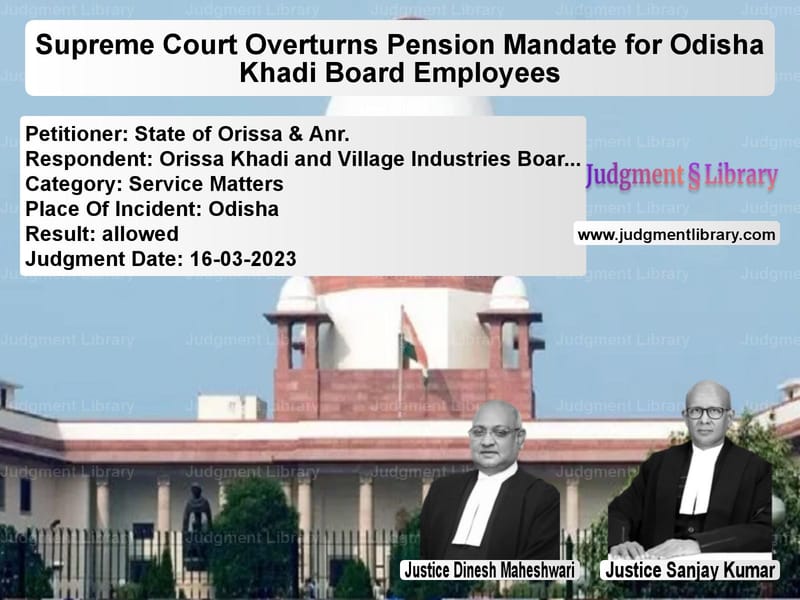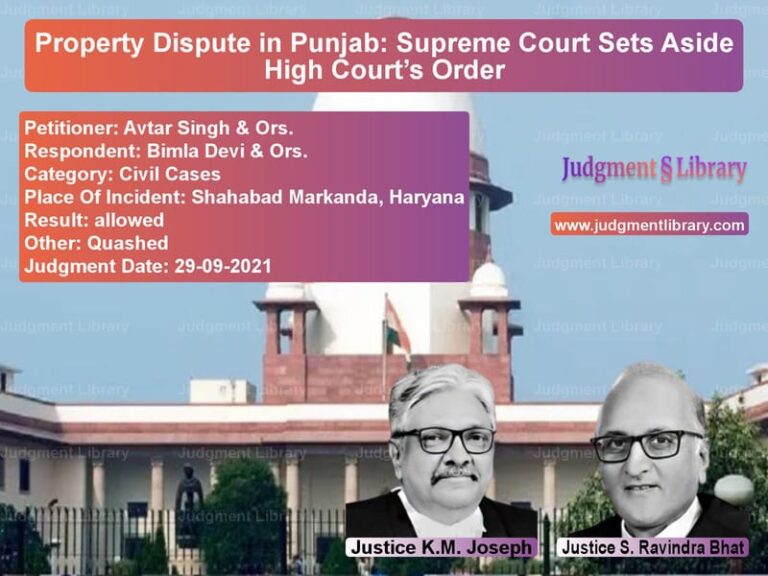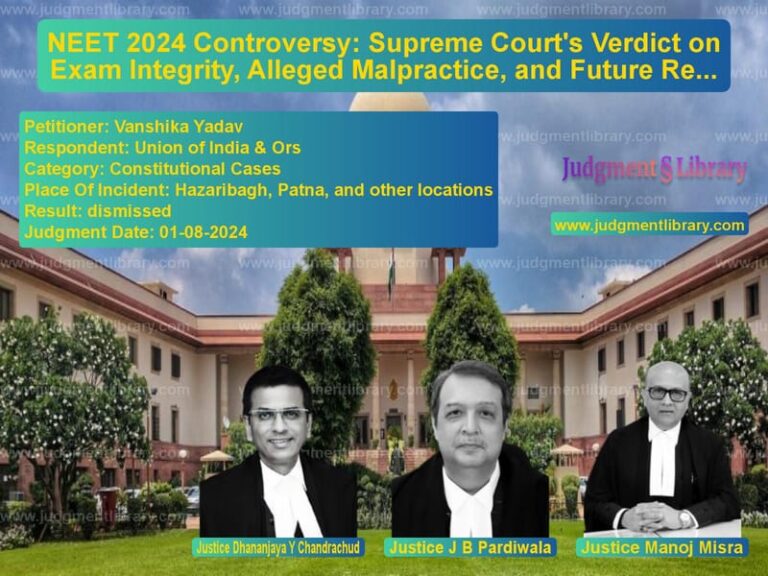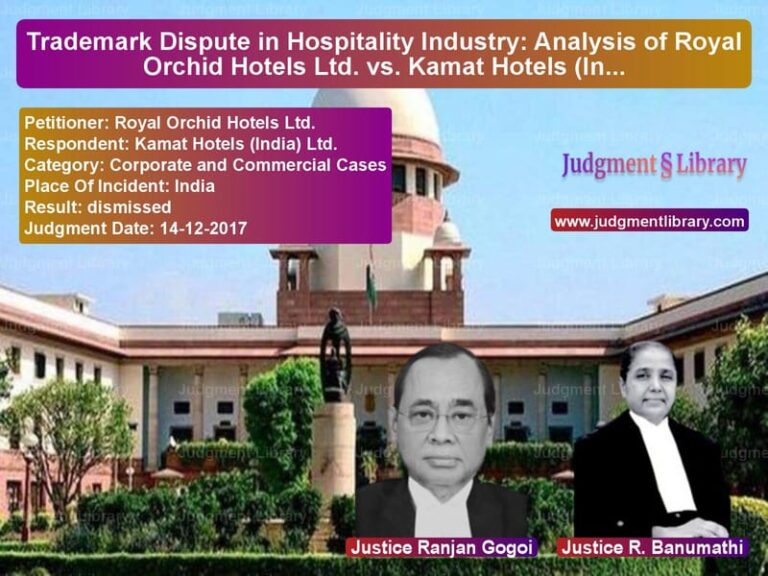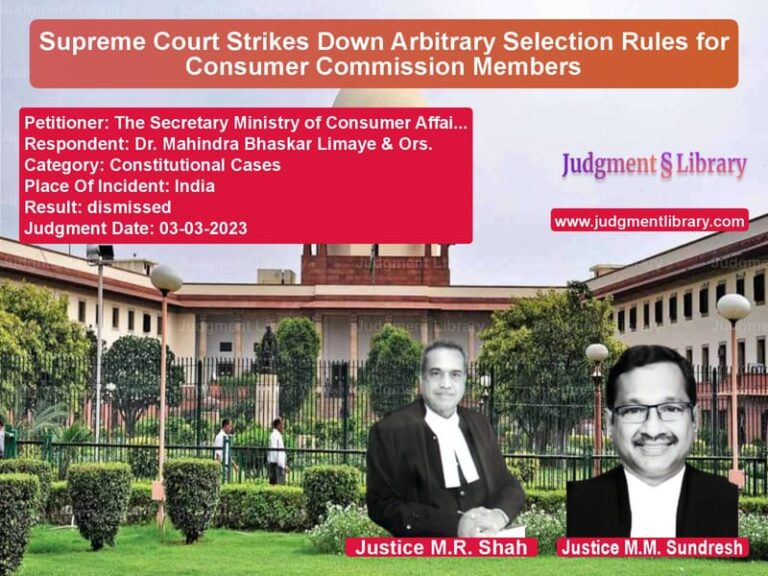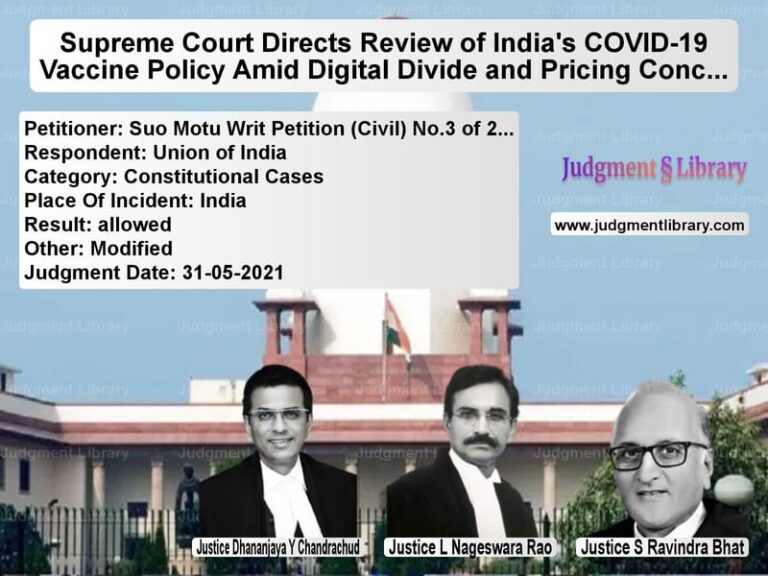Supreme Court Overturns Pension Mandate for Odisha Khadi Board Employees
The Supreme Court of India recently delivered a significant ruling in the case of State of Orissa & Anr. v. Orissa Khadi and Village Industries Board Karmachari Sangh & Anr., where it set aside the Orissa High Court’s directive mandating pension benefits for employees of the Orissa Khadi and Village Industries Board. This judgment emphasizes the legal limitations on courts directing the government to amend service regulations and underscores that pensionary benefits must be granted based on existing legal provisions.
The case revolved around whether the employees of the Orissa Khadi and Village Industries Board (hereinafter referred to as the “Board”) were entitled to pension benefits at par with state government employees. The Supreme Court ultimately ruled that since the Board’s regulations explicitly denied pension benefits, the courts could not intervene to mandate changes in service conditions.
Background of the Case
The dispute began when the Orissa Khadi and Village Industries Board Karmachari Sangh (an association of the Board’s employees) demanded pensionary benefits similar to those granted to state government employees. The Board was established under the Orissa Khadi and Village Industries Board Act, 1955 (hereinafter referred to as the “Act of 1955”) to promote and regulate Khadi and Village Industries across Odisha.
Under Regulation 52 of the Orissa Khadi and Village Industries Board Regulations, 1960, employees of the Board were entitled only to gratuity and contributory provident fund (CPF) benefits, explicitly excluding pensions. Despite this, the employees argued that since they were governed by service rules similar to state government employees, they should receive pensions.
Legal Battle and High Court Rulings
Initially, the Board proposed introducing pension benefits for its employees and corresponded with the state government on the matter. However, the State of Odisha ultimately rejected the proposal, citing financial constraints and administrative difficulties.
The employees then approached the Orissa High Court in W.P. (C) No. 8438 of 2010, challenging the state’s decision. The Single Judge Bench ruled in favor of the employees, directing the government to amend the regulations and introduce pension benefits at par with state government employees. The state government challenged this order through an intra-court appeal, but the Division Bench of the Orissa High Court upheld the ruling, terming the directive “advisory” but emphasizing the government’s constitutional obligation under Article 41 of the Directive Principles of State Policy.
Dissatisfied with this decision, the State of Odisha approached the Supreme Court.
Arguments of the Parties
Petitioner’s Arguments (State of Odisha)
- The High Court overstepped its authority by directing amendments to service regulations, which falls exclusively within the government’s policy domain.
- Regulation 52 of the Board’s service rules clearly stated that employees were not entitled to pensions.
- The court’s directive was contrary to settled law, as pension entitlements must be governed by existing legal provisions.
- Financial constraints and administrative difficulties prevented the state from granting retrospective pension benefits.
- Providing pensions to Board employees would create demands from employees of other autonomous bodies, leading to widespread financial and administrative complications.
Respondent’s Arguments (Board Employees)
- The Board was an extension of the state government and exercised similar functions, justifying parity in pension benefits.
- Regulation 40 of the service rules applied state government service conditions to Board employees, implying that pension benefits should also apply.
- The government had entertained proposals to introduce pensions, indicating its willingness to extend benefits.
- Financial constraints were an inadequate excuse for denying pension benefits.
- Denying pensions to Board employees amounted to hostile discrimination, violating Articles 14 and 16 of the Constitution.
Key Observations of the Supreme Court
The Supreme Court carefully examined the Board’s governing law and regulations and ruled in favor of the State of Odisha, setting aside the High Court’s directives.
- Existing Regulations Govern Pension Entitlements: The Court emphasized that Regulation 52 explicitly denied pension benefits to Board employees, and courts could not override this regulatory provision.
- Courts Cannot Direct Policy Changes: The ruling reiterated that courts cannot mandate governments to amend service regulations, as these are matters of policy.
- Financial Constraints Are a Valid Consideration: The judgment acknowledged that financial implications must be considered when introducing pension schemes.
- No Violation of Fundamental Rights: The Court held that denying pensions under an existing regulatory framework did not constitute hostile discrimination under Articles 14 and 16.
- Directive Principles Are Not Enforceable Rights: While the High Court had cited Article 41 of the Directive Principles, the Supreme Court reiterated that these provisions do not create enforceable rights.
Final Ruling
The Supreme Court ruled in favor of the State of Odisha and overturned the High Court’s order, stating:
- The government was not obligated to amend Regulation 52 to provide pensions.
- The High Court’s directive was beyond its jurisdiction.
- Board employees were only entitled to benefits prescribed under existing regulations.
- Financial and administrative considerations were valid grounds for the government’s decision.
Accordingly, the appeal was allowed, and the employees’ demand for pension benefits was rejected.
Implications of the Judgment
This ruling carries significant implications for public sector employment policies:
- Judicial Limitations: Courts cannot interfere with policy decisions unless fundamental rights are violated.
- Respect for Service Regulations: Employees are entitled only to benefits explicitly provided in applicable regulations.
- Financial Prudence in Public Administration: Governments are not obligated to introduce pension schemes if financial constraints exist.
- Clarity for Autonomous Bodies: The judgment reaffirms that state government employees and employees of autonomous bodies are separate categories.
Conclusion
The Supreme Court’s decision in State of Orissa v. Orissa Khadi and Village Industries Board Karmachari Sangh clarifies the legal position on pension entitlements for employees of statutory bodies. By overturning the High Court’s directive, the ruling reinforces that courts cannot mandate changes in government policy and that pension benefits must be governed strictly by existing legal provisions.
This judgment sets a precedent that while social security is essential, policy decisions regarding pensions remain the prerogative of the government. Employees of statutory bodies must rely on established service conditions rather than judicial interventions to claim pension benefits.
Petitioner Name: State of Orissa & Anr..Respondent Name: Orissa Khadi and Village Industries Board Karmachari Sangh & Anr..Judgment By: Justice Dinesh Maheshwari, Justice Sanjay Kumar.Place Of Incident: Odisha.Judgment Date: 16-03-2023.
Don’t miss out on the full details! Download the complete judgment in PDF format below and gain valuable insights instantly!
Download Judgment: state-of-orissa-&-an-vs-orissa-khadi-and-vil-supreme-court-of-india-judgment-dated-16-03-2023.pdf
Directly Download Judgment: Directly download this Judgment
See all petitions in Pension and Gratuity
See all petitions in Employment Disputes
See all petitions in Public Sector Employees
See all petitions in Judgment by Dinesh Maheshwari
See all petitions in Judgment by Sanjay Kumar
See all petitions in allowed
See all petitions in supreme court of India judgments March 2023
See all petitions in 2023 judgments
See all posts in Service Matters Category
See all allowed petitions in Service Matters Category
See all Dismissed petitions in Service Matters Category
See all partially allowed petitions in Service Matters Category

